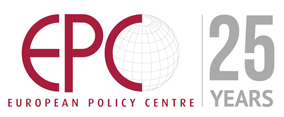(March 11, 2024 – EPC)
Speakers:
- Aki Tonami, Associate Professor, International Relations and Economics, University of Tsukuba
- Akira Igata, Project Lecturer, Research Center for Advanced Science and Technology, University of Tokyo
- Amanda Paul, Deputy Head and Senior Policy Analyst, Europe in the World Programme, European Policy Centre
- Ambassador Romana Vlahutin, Distinguished Fellow for Geostrategy, German Marshall Fund
- Eva Valle Lagares, Head of Unit, Far East, DG Trade, European Commission
- Georg Riekeles, Associate Director and Head of Europe’s Political Economy Programme, European Policy Centre
- H. E. Kazutoshi Aikawa, Ambassador of Japan to the EU
Moderator:
- Pawel Swieboda Swieboda, Senior Visiting Fellow, European Policy Centre
The aim of this conference organized by the European Policy Centre (EPC) was to shed light on the crucial role of economic security in today’s global landscape, with a specific focus on strategies and challenges faced by both Japan and the EU. Ambassador Kazutoshi Aikawa set the tone in his opening address, emphasizing the pivotal role of economic security in ensuring resilience and strategic autonomy. He underscored the challenges posed by increasing dependence on dominant economic players such as China, particularly highlighted by disruptions in supply chains during the Covid-19 pandemic. These disruptions underlined the urgent need for a more diversified economy.
Japanese and European perspectives on economic security
Leading experts Aki Tonami and Akira Igata provided insights into economic security, shedding light on Japan’s specific challenges and opportunities for collaboration with the EU. Aki Tonami highlighted the “Brussels Effect,” wherein EU regulations influence global standards, creating challenges for Japanese enterprises navigating divergent regulatory requirements. Additionally, Tonami stressed the growing importance of transboundary economic security issues, such as human rights and labor rights, calling for enhanced cooperation between Japan and the EU to develop a global economic security framework.
On the other hand, Akira Igata identified several specific areas of potential collaboration between Japan and the EU. Economic security has emerged as a major concern for both entities, with each developing its own approach to address the growing challenges. Both share similar concerns regarding the protection of critical and emerging technologies against potential adversaries, notably China. Japan has already started implementing measures such as outbound investment screening to prevent the funding of sensitive technologies. Meanwhile, the EU has also taken initiatives, such as the economic coercion instrument, aimed at safeguarding its economic interests against external pressures. However, there are differences in approaches. For instance, Japan has been more proactive in coordinating with international partners on issues like export and investment controls, while the EU has focused on supply chain diversification and strengthening trade policy instruments. Lessons learned from each other can be valuable. The EU can learn from Japan’s proactive approach to international coordination, while Japan can benefit from the EU’s expertise in supply chain diversification and trade policy.
Challenges and prospects for strengthened cooperation
In recent years, as explained by Eva Valle Lagares, economic dialogue between the EU and Japan has gained significance, marked by more frequent and intense meetings, underscoring the partnership’s importance. Japan has taken a proactive approach to economic security, establishing a dedicated ministry and adopting a specific strategy. Similarly, the EU has initiated risk assessments and put mechanisms in place to safeguard investments and exports. These efforts have led to the establishment of a working group focused on economic cooperation, particularly in fostering transparent and resilient supply chains. The EU’s economic security strategy emphasizes promotion, protection, and partnership, aiming to ensure competitiveness and resilience, mitigate risks through measures like revising investment and export controls, and foster international cooperation with partners such as Japan to address common challenges. The projects are still discussed, so proposals and ideas will continue to shape future discussions, guiding coordinated and effective efforts to enhance economic security while respecting the competencies and interests of all involved parties.
Finally, Japan’s pioneering role in economic security was highlighted by all speakers, emphasizing valuable lessons for the EU. Recent events, such as the WTO ministerial meeting in Abu Dhabi and disruptions in supply chains during the Covid-19 pandemic, underscored the urgent need for a more resilient and diversified economy. Japan, like the EU, faces challenges posed by China, including restrictions on essential exports like rare earths. This reflects a global shift where the world is splitting into two distinct trade blocs, intensifying the strategic rivalry between the United States and China. In this context, it is crucial for the EU to play both defense and offense while maintaining open relations with the outside world. However, the EU still faces challenges such as the lack of clear choices in economic security, insufficient investment funds, and the need for increased institutional capacity for effective coordination. Ultimately, the EU must adapt to this new economic security paradigm by developing strong partnerships, investing in innovative solutions, and enhancing institutional capacity to address future challenges.
Link to the conference:
https://epc.eu/en/events/EU-Japan-cooperation-on-economic-security~58ab38

